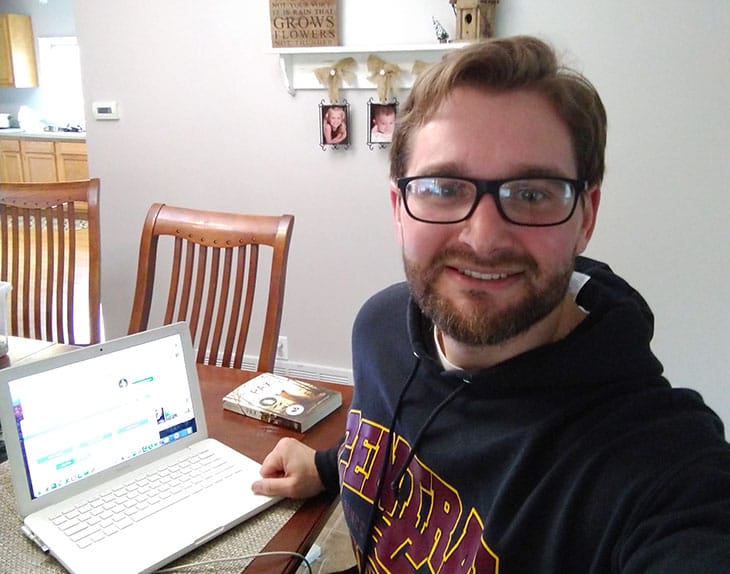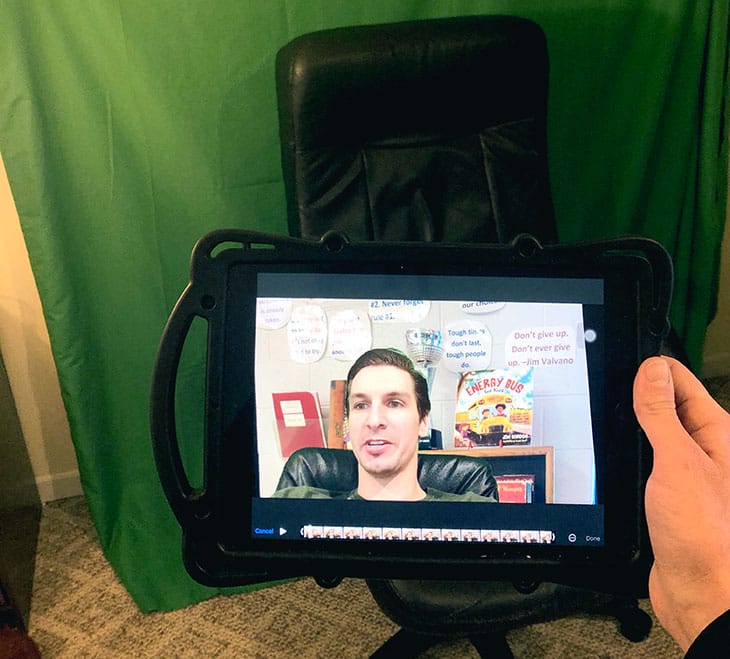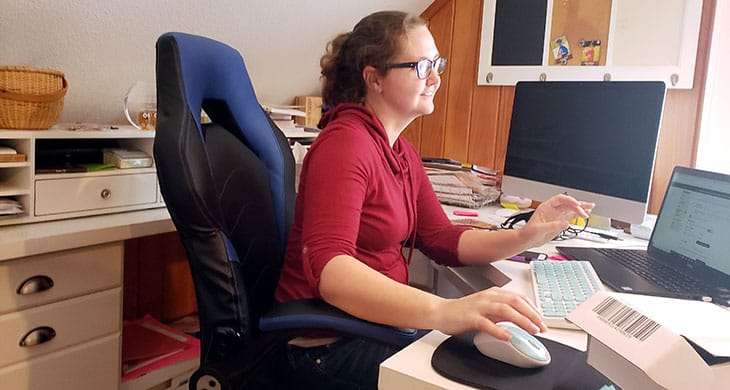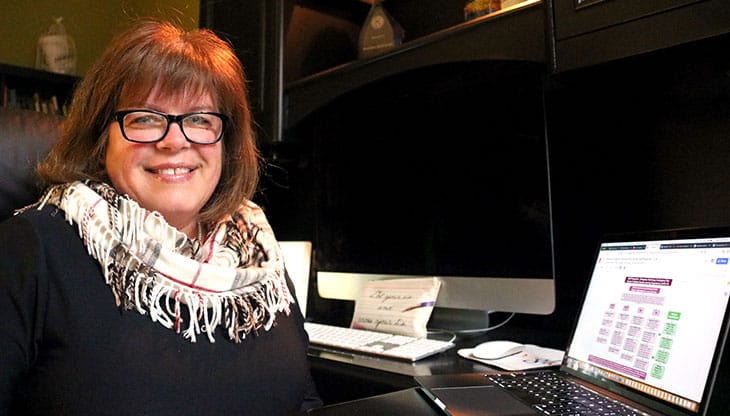Bringing distance learning within reach
As K-12 schools go online, CMU education alumni lead the way in tech and teaching
It's not just students getting an education at home in the weeks since K-12 school buildings have closed to slow the spread of COVID-19.
Teachers, staff and administrators are learning quickly, too. Meet five Central Michigan University alumni supporting student success in this challenging time.
Technology is a lifesaver
Name: Jeremy Winsor
CMU degree: Bachelor's degree in secondary science education, emphasis on earth and space science and biology, 2006.
Position: Teaches high school earth science, high school biology and eighth grade science in Fulton Schools, Michigan.

"I'm getting really good at dressing nicely from the waist up," teacher Jeremy Winsor said of conducting distance learning with his science students.
If Jeremy Winsor can't bring his students to the creek, he'll bring the creek to his students.
Winsor, a Michigan Department of Education 2019-20 Regional Teacher of the Year, teaches science in his rural district north of St. Johns, Michigan.
In his classroom, he and his students raise salmon from fingerlings and release them at the end of the school year. Now, he continues to care for the fish and plans to produce a video of their release for his students learning at home.
His overall mission now: Keep students active and engaged.
"I've been pushing out a video lesson every day," he said — including improvised content such as frog and toad vocalizations recorded in his backyard.
He champions educational tech but knows not everyone does — or did until now.
"The technology we've been apprehensive about having in our classrooms is now a lifesaver," he said.
Connecting offline, too
Name: Rachal Gustafson
CMU degree: Bachelor's degree in education, 1997.
Position: Special education teacher in Rapid River Public Schools, Michigan.

"A big part of becoming a leader is experience," said Rachal Gustafson, who credits CMU with providing a strong foundation. "I had a good basis to start from and get me to where I am today."
In a region where internet service is spotty and 20% of school families have no access at all, and where some of her special education students are nonverbal, Rachal Gustafson has her work cut out for her in a time of distance learning.
"I can't send my students to a website to work on the life skills we're focusing on," she said.
A Michigan 2019-20 Regional Teacher of the Year, Gustafson works directly with about 12-15 students in her Upper Peninsula district about 20 miles east of Escanaba, Michigan, and serves the entire district.
She's flooding social media with info about parent resources and helping other teachers upload information and work with the district's tech team. But she and her colleagues also connect with students and families through food distribution and deliveries, writing letters, and making phone calls.
"We're reaching out to families," she said. "Just hearing your voice is important. This is a tough time for everyone, and we're thinking of them." I'm there and I care
I'm there and I care
Name: Zach Rondot
CMU degrees: Bachelor's degree in elementary education, 2013, master's degree in educational technology, 2016.
Position: Fourth grade teacher in the Troy School District, Michigan.

Zach Rondot shows the background he inserted into a lesson video using the green screen he set up at home. "The most important thing is not just the academics but the personal connection," he said.
Zach Rondot is into educational technology and has the green screen to prove it. He uses it to create backgrounds for video lessons. Sometimes, for a sense of normalcy, he uses photos of his classroom as the backdrop.
In his metro Detroit school district, third through ninth grade students use school-issued iPad tablets. But Rondot knows no one learns by tech alone.
"One of the big things I learned at CMU was a mindset," he said. Educational tech is about making learning more meaningful and connecting with students — "using technology for a greater purpose, not just for the sake of technology."
Right now, by being online as much as possible so he can comment and interact in real time, he creates a personal, one-on-one learning environment even though he and his students are miles apart.
"I let them know I'm there for them and care for them," he said. "I'm proud of them for all they're doing."
Prepared to pivot
Name: Ashley McBride
CMU degree: Graduating in August with a doctorate in educational technology.
Position: Director of technology for Dare County Schools, North Carolina.

Ashley McBride ordered 100 Wi-Fi hotspots for internet access to serve students now learning remotely in her school district.
Ashley McBride came to Kitty Hawk, North Carolina, about a year ago expecting to boost her district's remote learning capability in time for next winter's snow days. The coronavirus forced a different timeline.
"What this has really taught me is be prepared to pivot at any moment," she said.
McBride, who finished her dissertation defense just a few weeks ago, learned the value of webinars from her online CMU degree program. Now she presents weekly webinars for her district's teachers, teaching them about best distance-learning practices and online learning platforms such as Seesaw and Google Classroom.
"A lot of the stuff that I do are things my professors did with us in class," she said.
Now her next pivot is underway: switching from a planned two weeks of distance learning to finishing out the school year online. Her staff of instructional technology facilitators and librarians in the district's 10 buildings are helping teachers convert their lesson plans to online curricula.
"We went from 'this is just a time for review' to gearing up to figure out what has to be taught."
A plan to succeed
Name: Heather Kellstrom
CMU degree: Doctorate in educational technology, 2019.
Position: Interim executive director of instructional and information technology in Ann Arbor Public Schools, Michigan.

CMU's Doctor of Educational Technology degree program prepared Heather Kellstrom to lead. "From being in that program," she said, "I have a deeper level of self-efficacy, of confidence."
In February, as concerns about the coronavirus began to spread in the U.S., Heather Kellstrom sensed a new vibe in the airports on a trip out West.
"There was just this unsettledness and nervousness," she said. Other people might have shrugged it off. Kellstrom drafted contingency plans. Two weeks later, her 25-person team was ramping up from staff tech support to serving every student and family in the district.
"Our user base just went from 2,000 to 45,000," Kellstrom said.
Faced with turning a single help desk into three to serve families, teachers and administrative staff, she called on her leadership skills. She shared plans with her team, with names attached to tasks, and asked: "Can you do this job, and what do you need from me right now?" Confidence grew as the team dug into the plan.
That was March 11. The governor's order to close schools came the next day.
"Because of that meeting," she said, "we were able to turn our services around on a dime."
Kellstrom's teamwork approach comes directly from her CMU experience, where online students in the Doctor of Educational Technology program bond as a cohort — not top down but shoulder to shoulder.
"When you're in a cohort, you find value in everyone who's in that cohort," she said. The proof that her approach works? "We've done about a month's worth of work in 10 days."